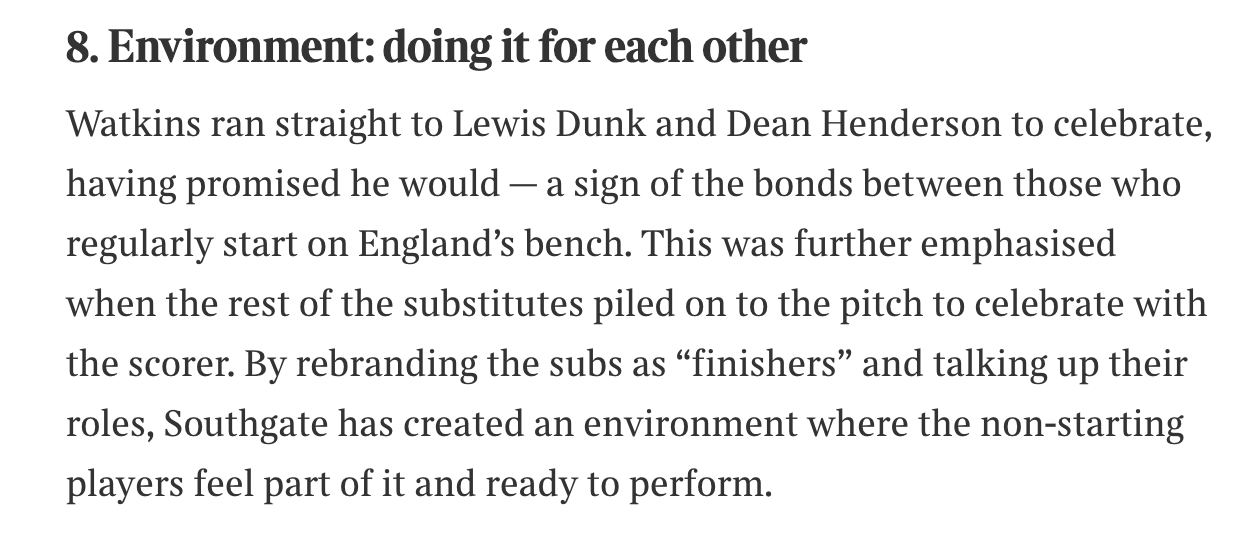Good culture is by design
ALSO: Modern work is too many meetings and too many pings…
With the end of the European Championships football (and the departure of England manager Gareth Southgate) there were a few pieces signalling the progressive nature of his regime that felt worthy of being called out.
One lesson that comes through all of the analysis is the idea that good culture doesn’t happen by accident - and leaders need to take responsibility for designing it. Those without long memories might have forgotten that the previous England manager, Sam Allardyce set about creating a feel good factor in the camp by inviting a comedian to deliver an after-dinner speech to the squad. I’m cringing just by having to type those words.
What becomes clear in the interviews and articles below is that concepts like belonging and psychological safety aren’t just concepts that are appealing to the leaders of the group, to become reality they need to be reinforced through as many touchpoints as possible.
In the past I’ve interviewed Dr Pippa Grange, who was brought in to Southgate’s England to help with culture. (Full transcript and notes)
Grange sat down for a long interview in 2019 with The Psychologist about her brief with England. The FA hadn’t just wanted a sports psychologist but someone who would integrate sports psychology into collective culture:
“I'm a big believer that the environment you walk into is a massive factor in how you are going to behave. Psychological safety, how any of us feel when we walk into a place and see whether we fit, and whether it's OK to have a go and to risk failing, is critical.
Let alone whether we can hear what it is we need to learn.
We quite deliberately work on the system and the people who are closest to the athletes. So actually some of the stuff I do with the kit men and the physical therapists is as powerful as anything else, because they're spending an hour at a time in intimate, one-on-one settings where people talk.
Having them understand what great culture looks like, giving them a lens into what kind of challenges an athlete might be facing, and encouraging good influence skills, good relational skills, a really solid understanding of who we are… I think that's quite powerful.”
Most organisations don’t think about psychological safety in a system thinking kind of way, considering every touch point for individuals. Grange gives a compelling account of what the psychologist seeks to do in such an elite environment.
This article in The Times goes someway to illustrate the attention to detail of the approach. The role of ‘substitute’ might be perceived as a secondary role, for the tournament the team referred to replacements as ‘finishers’ rather than substitutes - which contributes towards capturing the importance of coming on late to a match. It’s another example of how building an effective team requires making everyone feel like their contribution is important:
I also spoke to Owen Eastwood who worked extensively with Gareth Southgate’s team as they cultivated a clear sense of shared identity to bring meaning to their work. This is one my own favourite listens of the 200 episodes in the archive.
Whatever the final results on the field, it is evident that a focus on building a cohesive unit paid off in terms of the morale of players. There’s nothing in these lessons that we can’t bring to our own jobs.
Modern work is too many meetings and too many pings…
"White collar work is just meetings now" is the headline of a new piece by Derek Thompson in The Atlantic citing Microsoft data that meeting time has tripled since 2020.
Thompson is the smartest thinker about modern work and his articles are always essential reading.
“The paradox of the modern white-collar worker is that she is simultaneously more and less alone than her analogue in any previous generation.”
Thompson reports that typical workers are spending 57% of their time communicating with others: 'Today, knowledge work is, quantitatively speaking, less about creating new things than it is about talking about those things,' he says.
‘In the last few years, the business world has focused much more on inclusion and on letting more people’s voices be heard in decision-making,’ Thompson concludes
To add to Thompson’s point this LinkedIn post from Chris Herd is worth checking out. Herd is the guy who built a following by posting long Twitter threads about the inevitable shift to remote working. Here he concedes that remote working often fails because people mistake interacting on workplace chat apps for work: “Remote work has a Slack problem he says” - where speed of response is seen as an indication of greater productivity. A good read
If you’re looking for a solution to this my Presence deck has been downloaded about 40,000 times - a few tough, design decisions can be transformational for results. I did a free talk on this earlier this week - which you can access here
Jean Twenge is the world’s leading expert on generational changes created by smartphones. She’s written a guide to working with Gen Z workers that is worth checking out. (TL;DR they are less interested in making friends at work, but more interested in helping others, work/life balance is very important to them in contrast to previous generations, they aren’t self centred - but are pessimistic about the (and their) future. Overall Gen Z require more direction on tasks than previous cohorts of employees





Thanks for linking to Jean - it's great to see other writers focusing on gen z in the workplace, there is so much to say on the subject.
Totally not a fan of football but the idea of creating multiple touch points that generate psychological safety is a really useful way of thinking about it.
The culture can’t just be psychologically safe in the kitchen, it has to be safe in the teams chat and the boardroom too!!